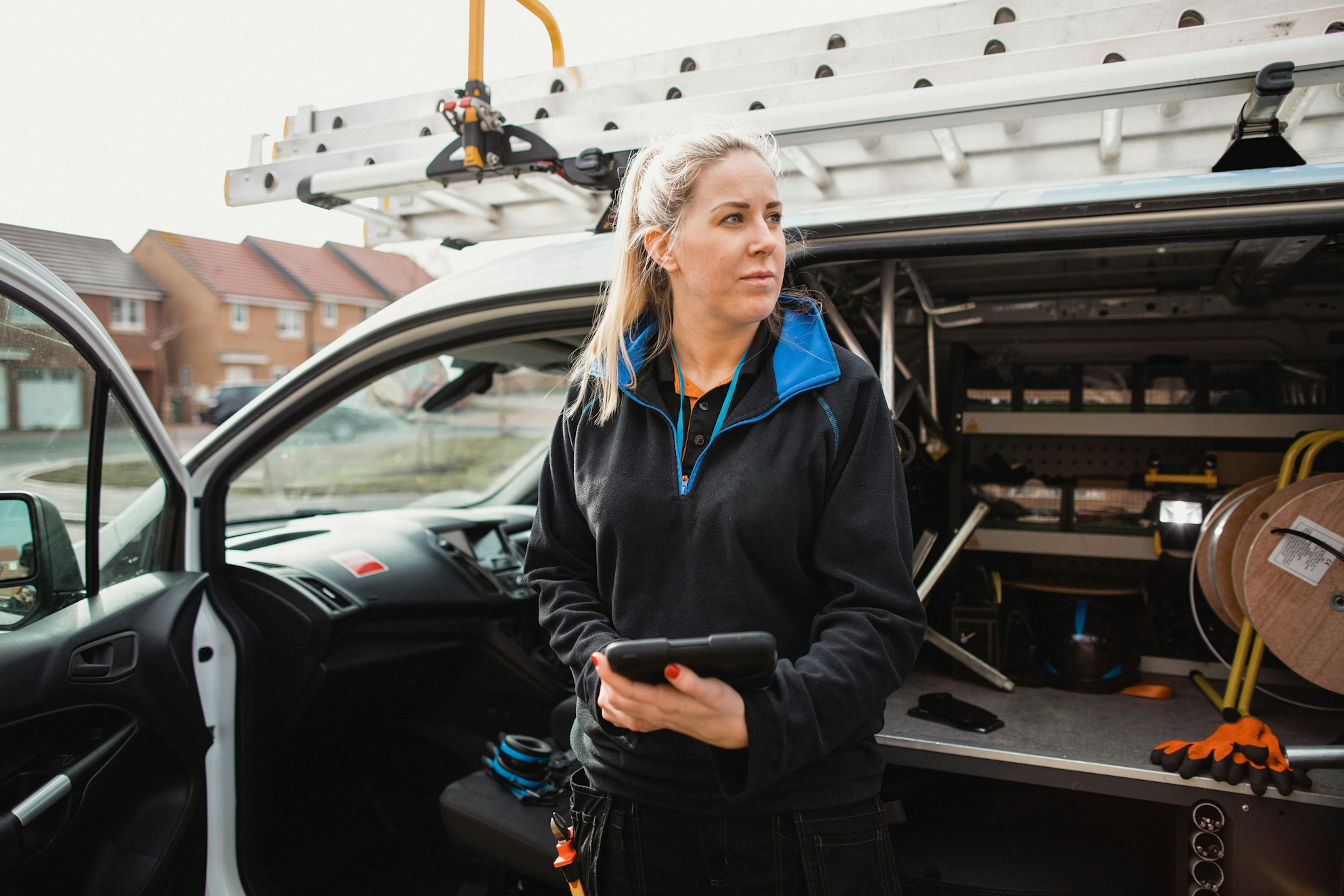If your organization requires your fleet to routinely carry heavy loads, it's essential to have the right size vehicles with the right features and configurations for the job. Whether you’re searching for medium-duty trucks equipped to meet the needs of your vocational order-to-delivery requirements, or heavy-duty work trucks that can handle high mileage and extreme payloads, selecting and spec’ing work trucks that meet all your needs can be overwhelming.
If you’re considering commercial work trucks for your own fleet, fear not. In this guide, we’ll take you through all of the key considerations to keep in mind during your search, as well as a selection of our most recommended picks. Read on to learn more.
The key considerations for selecting work trucks.
The terms “work trucks” or “commercial trucks” usually refer to medium-duty trucks—models with stronger frames, bigger engines, and larger brakes that can shoulder heavy loads and manage hilly terrain with less difficulty than, say, a cargo van. These vehicles are incredibly versatile. A fleet work truck will typically be custom-built and upfit for a specific industry or application, often with a specialized body added on to a cab and chassis (as opposed to light-duty trucks, which are usually manufactured as one unit).
Vehicles are categorized into eight different classes based on their gross vehicle weight rating (GVWR), which refers to the maximum amount of weight that a vehicle can safely handle (including passengers, fuel, and cargo). Most medium-duty trucks fall within classes 4 through 6 of the U.S. truck classification system, which is defined by the Federal Highway Administration and used consistently throughout the fleet industry.
CLASS 4 GVWR: 14,001 to 16,000 pounds; model example/s: RAM 4500, Ford F-450 (chassis cab)
CLASS 5 GVWR: 16,001 to 19,500 pounds; model example/s: RAM 5500 and Ford F-550
CLASS 6 GVWR: 19,501 to 26,000 pounds; model example/s: Ford F-650
There are several options to choose from within these three classes, so whether you’re a delivery company hauling large appliances or a landscaping team carrying loads of gravel, there exists a medium-duty truck to suit your needs. That being said, every fleet is unique. The right model and upfit for your business will depend on your distinct operations and goals.
When selecting a commercial truck for your fleet, consider your responses to the following questions:
- What are you hauling or towing? Consider both the weight and the size of your payload and the vehicle’s GVWR. What you’re hauling or towing will dictate the class of vehicle you need, as well as the body type and configuration of your selection. For example: a tow truck or dump truck will need a different setup than a commercial truck that is delivering heavy kitchen appliances.
- Where are you operating? Where you’re driving is just as important as what you’re hauling. If your fleet is mostly running on flat city streets, you might value maneuverability and a smaller turn radius. If you’re hauling heavy loads over hilly terrain, you’ll want to prioritize torque and horsepower instead. You can also consider the most common speed limits in your service area to ensure your selection can operate at prevailing traffic speeds and merge safely.
- Who will be driving? Your driver’s skill set and comfort with operating a heavy duty work truck should also factor into your selection. The size and class of the vehicle can also dictate if your drivers will need a Commercial Driver’s License (CDL).
- Gas or diesel? Diesel trucks are typically more expensive than gas but offer higher fuel economy ratings and more torque and towing power. Diesel trucks may offer a longer duty cycle as well, and are better choices for high mileage applications that are over 30k miles per year. Gas trucks, on the other hand, are lighter, faster, and often less expensive to maintain. The right pick for your company will depend on your needs and objectives.
Don’t overlook the commercial truck dealer relationship.
Do yourself a favor and consider these critical factors during your commercial truck selection: the assistance of your fleet management partner, your relationship with a commercial sales division of local auto dealers, and the reach of dealer networks in your area.
“The dealer support network and manufacturer support network are an often-overlooked piece of information when it comes to adding vehicles to your fleet.”
- Marc Layman, manager of truck upfit at Mike Albert Fleet Solutions.
When selecting a heavy duty work truck dealer, you’ll want to consider:
- How far away is the nearest dealer to your operation?
- How good are they at providing repairs and maintenance, and are they competitively priced within the industry?
- If you need to get a vehicle serviced, how quickly can they get you in? Your existing relationships with a fleet partner, OEMs and dealers should also play a role in your decision—not just for ongoing support, but for the purposes of even obtaining new vehicles. This is especially true as ongoing vehicle shortages continue to plague the industry.
“Let’s say a fleet owner has 150 vehicles from one manufacturer in their arsenal—it’s fair to say they already have a longstanding relationship with that OEM,” says Jason Kraus, director of OEM and product management at Mike Albert Fleet Solutions. “If that owner decides to go with another manufacturer for a work truck, they don’t have that existing relationship to leverage. That OEM may not even allocate a unit for them to factory order. If you already have a positive relationship with an OEM, with a commercial truck sales rep who is going to pick up your urgent call in the middle of the night, that’s an intangible benefit.”
If your fleet is made up of more than fifteen vehicles, partnering with a fleet management company (FMC) gives you access to the benefits of established OEM relationships as well as truck and upfit consultation. FMCs also offer services to control costs and ensure compliant fleet operations. For example, Mike Albert’s fleet maintenance management service is made up of a reliable network of vetted truck maintenance service partners. Some of our premier service partner’s include incentives like priority service and discounted pricing.
If your business is growing geographically, you’ll want to make sure that you have access to the services you need wherever you are, which can be a huge undertaking for a fleet manager. Engaging a fleet management company can provide support and ensure that your fleet is running smoothly, while you focus on your business.
Consider your work trucks' customization options.
Perhaps the biggest benefit of heavy duty work trucks is the level of customization they afford to business owners. No matter the industry or application, you can essentially build the exact vehicle you need to get the job done—from payload and fuel tank capacity to transmission type and chassis selection. Depending on how a work truck will best benefit your fleet, you can spec features and configurations like:
- Engine: Gas, diesel, or alternative fuels; duty cycle; power ratings
- Drive train configuration: The right blend of engine power, gear ratio and transmission options to meet power and fuel economy needs
- Type of truck selection: Conventional or Cabover (consider whether your fleet operates in cities, suburban areas, or inter-city)
- Transmission: Automatic or manual
- Cabs: Static or air ride
- Rear suspension: Spring or air ride suspension (where available)
- Seats: Spring or ride (where available)
- Fuel tanks capacity: Can be optimized for application
- Cab: Regular, Extended or Crew
- Drivetrain: 4x2 or 4x4
- Brakes: Hydraulic or air brakes (where available)
- Vocational prep: Snow plow prep, heavy-duty front springs, etc.
- Axles suspension: Front axles and rear axles
- GVWR and payload capacity
- Safety systems
- Trailering packages: Wiring, mirrors, brake controller, etc.
- Tires for application: Consider fuel economy, terrain, weather conditions
Our top picks for work trucks.
Below is a list of our top five current commercial work trucks based on durability, reliability, and available customization options. However, because work trucks are so versatile and can be configured with different drivetrains, payload capacities and more, it’s important to discuss the best options with your preferred OEM or fleet management company.
- Ford Super Duty F550 (Class 5)
- Isuzu NPR (Class 4)
- Freightliner M2 (Class 6)
- Chevy Silverado 4500/5500/6500 (Classes 4-6)
- Ford F650/F750 (Class 6-7)
At Mike Albert Fleet Solutions, we take pride in finding, spec'ing, and upfitting the perfect vehicles for our clients. Interested in adding commercial work trucks to your fleet? Contact us for a free fleet consultation today.
Skills covered in the class
Fleet Safety
Operational Efficiency
Optimal Vehicle Health
Vehicle Specification
Did you enjoy this class?
Share it with your organization and colleagues.
Sign up for our newsletter for the latest information about the fleet industry.
Sign up for our newsletter for the latest information about the fleet industry.



